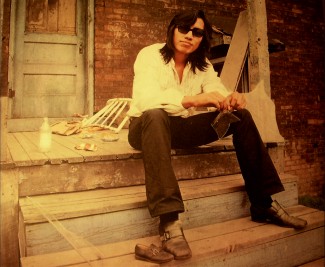‘Searching for Sugar Man’ finds a rock star in the unlikeliest of places

Before watching Searching for Sugar Man, the surprisingly invigorating documentary that’s recently been nominated for an Oscar, I had no idea about Rodriguez or his music. This American folk musician cut a couple of albums in the 1970s, but nobody listened to them in the United States.
Before the songs spread like wildlife in apartheid South Africa, the singer was believed to have killed himself on stage. Some even believing the legend that he lit himself on fire after singing a sorrowful song.
His mythology continued for decades. Who was this man named Rodriguez? Although his songs weren’t hits in the States, they spoke to the people of South Africa and their struggle with issues of poverty, respect and segregation. His “apparent” death on stage only heightened the mystery of this man.
In the 1990s, two men, a journalist and fan of the singer, teamed up to find out the true story. Tracking down his family in Detroit and his origins, the two set out on a global chase for truth. Unbelievably, what they found was far from their expectations.
I’ll stop the plot synopsis right there. And I’d recommend not talking to anyone about the film. It’s great to experience this story with a fresh mind.
Director Malik Bendjelloul has coupled archival footage with new interviews to create a stirring narrative. The documentary tilts back and forth among several themes, whether it be the inherent mystery of Rodriguez’s death or the images of 1970s Detroit. The best decision that Bendjelloul makes is letting Rodriguez’s songs play for a while over wonderfully evocative images. This is, after all, a documentary about a musician; his music needs to be heard and appreciated.
As an American, I’m ashamed I didn’t know about this man and his beautiful, beautiful words. He’s no cheap ripoff of Bob Dylan; Rodriguez’s skills are as good as any of the folk greats. He sings of such hurt, such promise, such solidarity with his fellow man. He’s also unmistakably real, carving out portraits of drug dealers and other colleagues of his day-to-day reality.
Searching for Sugar Man can’t quite live up to the same excellence as its subject. As a film, it smartly gets out of the way and lets the musician and his fans tell the story. This is the right move, but it also means the documentary feels like an exercise in simplicity. When a person is as compelling as Rodriguez, he can’t be contained in a film that runs less than 90 minutes.
This may be that rare film where the soundtrack is more important than the film itself.
By John Soltes / Publisher / John@HollywoodSoapbox.com
-
Searching for Sugar Man
2012
-
Directed by Malik Bendjelloul
-
Running time: 86 minutes
-
Rated PG-13 for brief strong language and some drug references
-
Rating:






I was one of the many who bought Cold Fact (in a Johannesburg music store in 1973) and have listened to it on-and-off for the last 40 years. It is as evocative today as it was back then. It took nearly ten more years for the album to really start influencing young Afrikaners. In the 1970’s we bought the album mostly because it was good music – and because it had been “banned” by the country’s censors. We appreciated its political statements in the 70’s, but at that stage it was not a major influence on young people’s political enlightenment. True – it was very popular – right from the start. Despite assertions of bootlegging and piracy, everyone I knew who had the album had bought a legitimate vinyl copy. Remember… this music was never aired/broadcast, so the only way to guarantee good sound reproduction was to have an original disc. More than 80% of popular music (globally popular) was never aired in South Africa, and music fans were fiercely protective of their original albums. You never loaned them out… you had to buy your own copy. Cassette tapes were made – but principally for use in a car (this was pre-CD). But we all had the vinyl record.
I have known this story for nearly 15 years, so I initially thought I would not be moved by Bendjelloul’s film… but I was…
Believe me… the film is as important as the soundtrack… particularly if you are part of that story…